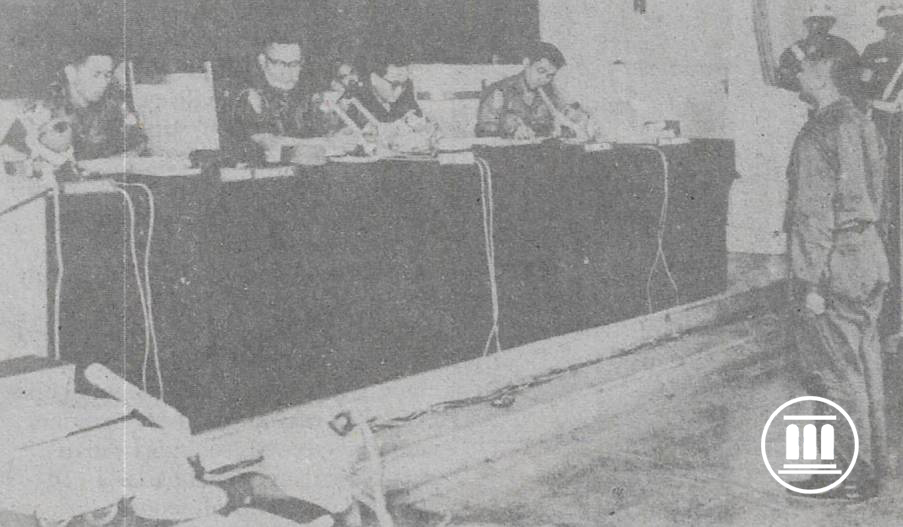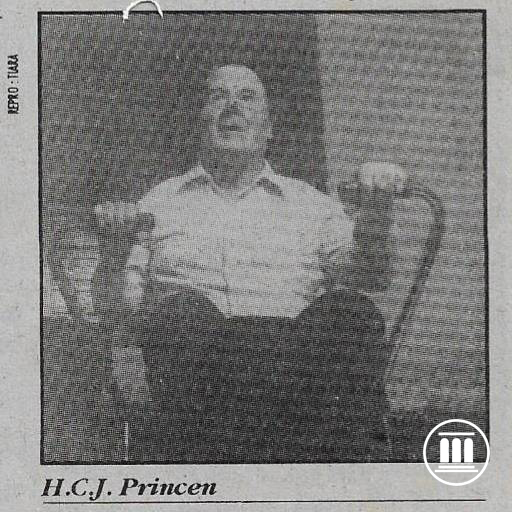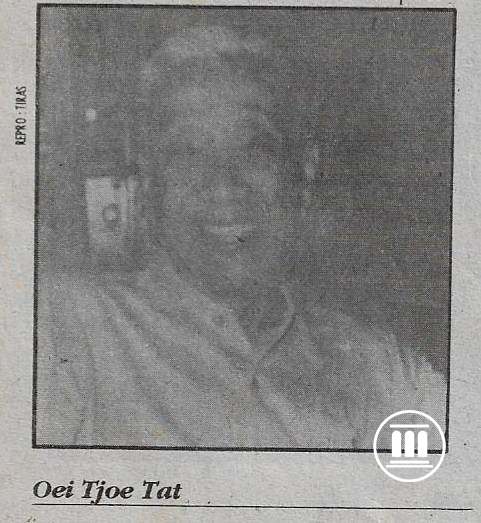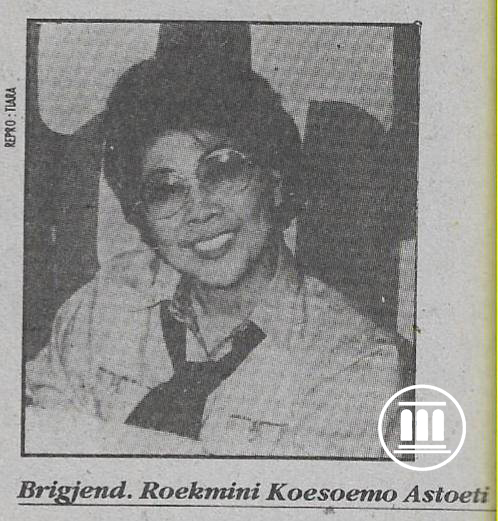
©Arsip/BAL
This article was originally published in Indonesian on October 1, 2019.
Ending the memorial day of the September 30th Movement (G30S), BALAIRUNG re-published archives regarding political and legal dynamics in those days and after. In this opportunity, BALAIRUNG talks about various things, from political prisoners of the Old Order and the New Order to national reconciliation efforts. This article was published in the Berita Tema rubric about specific themes of the BALAIRUNG Magazine Issue NO. 22/TH.IX/1995. We edit some minor things, including diction and language, for readability purposes before re-publishing it on this website. Below is the article.
It is said that when Soekarno—the first president of Indonesia—was in his sixties, around the 1960s, he felt anxious. While the revolution that started on August 17, 1945, is yet to be finished, he thought the Indonesian revolution was stagnant. The revolution should continue as long as the objective has not been achieved.
Yet, the Presidential Decree, which was said to be intended to end the unsatisfactory liberal democracy practiced by the politician, wasn’t helpful at all. The decree even caused a political void. The ‘unsatisfactory liberal democracy’ referred to the period of Guided Democracy under President Soekarno, which was characterized by political instability, economic turmoil, and the rise of communist influence. That’s when Indonesia had a legal regulation named Penetapan Presiden (Penpres)—part of the Presidential Decree that was only used in Soekarno’s Era—for the first time on July 22, 1959. That legal regulation established the Indonesian House of Representatives as soon as possible to replace the Constituent.
Penpres was considered a revolutionary law not long after the concept of guided democracy and economy appeared. PNPS No. 11/1063, known as the Subversion Law, was issued. This law was deliberately created as a tool to justify any means of achieving the revolution’s goals, as a way of bringing down the government’s political opponents. According to this Presidential Decree, everyone who does not accept the structure of Indonesian Socialism society based on the teachings of Manipol with its guided democracy is classified as a subversion factor that can be subject to subversion crimes.
Based on The Decree of the Provisional People’s Consultative Assembly (Majelis Permusyawaratan Rakyat Sementara (MPRS)), TAP MPRS NO. XIX/MPRS/1966, the Penpres must be reconsidered. The law said that every legislative product—outside MPRS’s product—that was not in line with the Indonesian 1945 Constitution should be reviewed. Strangely, the Penpres, a product of the Old Order, was reused in the New Order government.
Apparently, the Penpres was useful for the New Order because it could act as a tool to bring down the remaining ‘perpetrators’ of the G30S—which was rumored to be the Indonesian Communist Party’s (PKI) doing, hence why the event is commonly called G30S/PKI. The G30S/PKI was a failed coup attempt on September 30, 1965, which led to a violent anti-communist purge and the establishment of the New Order regime. History proved that the Penpres eventually sacrificed many lives, not just from PKI but also from those who came from Islamic circles or separatist movements. In the New Order era, Tahanan Politik or Narapidana Politik (Tapol-Napol)—which means political prisoners—became a label often used to put down their political opponents.
According to Prof. Dr. Ichlasul Amal, lecturer at UGM’s Faculty of Social and Political Sciences, the Tapol-Napol term was New Order’s signature. He saw contradictions in the boundaries of using the Tapol-Napol label. “Soekarno arrested Mochtar Lubis or Natsir in the Old Order era, but the Tapol-Napol label wasn’t pinned on them. There were no clear and definite boundaries or criteria on Tapol-Napol.” He added, “Political crime courts do not exist. The court could only adjudicate criminal cases that have occurred. Political beliefs can not be adjudicated. It could only be adjudicated when the belief was manifested in a harmful or destructive act.”

©Arsip/BAL
H.J.C. Princen even argues that Indonesia’s constitution protects political beliefs and political actions as long as they do not violate existing provisions. “If someone is detained or punished for their political actions, it is more because of the nature of the action, for example, if they use violence to kill the president, and not because of the nature of their political beliefs,” Princen said. For this Institute for the Defense of Human Rights director, Tapol-Napol does not exist in Indonesia’s political and legal system. Princen continued that every state has the right to protect itself from attempts to undermine and colonize the state and nation. Therefore, it is natural for the state to make a set of preventive and repressive rules regarding the dangers that threaten its sustainability. However, problems related to regulations curb democracy and human rights arise. “The truth is, in Indonesia, the state’s power is so strong that it can impose its will, hindering democracy,” he added.
New Order Political System
In fact, the Tapol-Napol phenomenon can’t be separated from the New Order political system as a whole. Even when PKI and its followers were successfully removed after the G30S/PKI failed in a power struggle, worry concerning sharp political conflict remains. The New Order government’s biggest fear was another ideological conflict that would rise like before, a fear that permeated the political landscape and created a sense of tension and uncertainty. Especially conflicts that came from right-wing and left-wing extremists. Any person or group that does not comply with the rules that have been determined can be made a political prisoner and earn the Tapol-Napol label.
Until the 1970s, issues regarding PKI were the most prevalent. Amnesty International recorded 1.014 cases of people arrested associated with the G30S/PKI. Out of this number, nearly half have been sentenced to death, life imprisonment, or 20-year sentences. From 400 cases that have been decided by the court, around 150 people were sentenced to the death penalty. The last data show that 67 people received the death penalty. Of that total, 18 people were executed, and three people were commuted—to life imprisonment, 20-year sentences, or released. The remaining 46 are waiting for progress in their cases.
Towards the 80s, the labeling of Tapol-Napol began to be targeted at Islamic circles. This emergence of a new political group target can’t be separated from the New Order government’s fear of some new radical Islamic groups. The government suspected that these groups were using religious sentiment as an appeal to be able to demand various things that accentuate Islamic values on the life of nation and state. They are worried that this would potentially disturb those who are not Muslims.
At around this time, massive manipulation against mass organizations and Islamic groups also took place. Such manipulation caused outbursts in public; opposition arose, which resulted in arrests. Based on Panjimas record, randomly from 1985 to 1987, 180 Islamic political prisoners languished in the small space of prison cells.
They were starting from Usroh, Darul Islam, Tanjung Priok, Jihad Command, distribution of banned leaflets, LP3K, preaching, stealing explosives, the BCA building’s explosion, Talang Sari Lampung, and various other cases. In addition to those who have been released, now around 30 people are still in prison with a prison term. Some got life imprisonment for those who were indicated with jihad command. Some others are between 18 to 20 years for those whose movements are identified with jihad command, Lampung, GPK Aceh, and the Pemudi Express Bus Bombing in Malang.
Other than those who came from G30S/PKI and Islamic circles, there were many Tapol-Napol from the separatist movements. Amnesty International recorded that about 80 people were arrested, with details of 24 people from the Free Aceh Movement, on average, imprisoned for life and 6 to 20 years, and 16 people from the Free Papua Movement were mostly imprisoned for life or got 6 to 12-year sentences. The rest came from the Fretilin Movement for an Independent East Timor. Later, there would be many Tapol-Napol from university students, human rights activists, the pro-democracy movement, and the labor movement.
Overall, based on the data BALAIRUNG collected from Yayasan Penghayat Keadilan, there were 263 political prisoners all over Indonesia. This number excludes those held in Irian Jaya, East Timor, Aceh, and Lampung’s military detention centers. Half of the recorded people were elderly and fighting sickness.
State’s Hegemony
Tapol-Napol is different from ordinary criminal prisoners. The basis for the Tapol-Napol conviction can not be separated from certain political reasons. During this period, the accusations towards them were that they were conspiring to overthrow the legitimate government or changing the Pancasila ideology with others. Former Tapol-Napol, such as Oei Tjoe Tat, Pramoedya Ananta Toer, HCJ Princen, Oemar Dhani, A. M. Fatwa, H. M. Sanusi, which BALAIRUNG contacted, all rejected the accusations.
A.M. Fatwa, for one, notes that assessing Islamic Tapol-Napol must be linked to the political events surrounding them at that time. The political events that occurred, according to Fatwa, did corner the interests of Muslims. Those were the things that ignited the courage to oppose.
Pramoedya even says that most of the Tapol-Napol who were thrown behind bars didn’t go through the court process. “I experienced it myself. I was being held for 14 years. There has been neither accusation nor trial for me until now. What wrong did I do? I was just thrown behind the bars,” he said. For Pramoedya, the situation at the time was full of sharp and aggressive ideological conflicts. “I was accused of being a LEKRA member when, as a matter of fact, I was just an honorary member. I was not a legitimate member. Then, about the socialist realism. Honestly, I didn’t know much. At the time, I was asked to talk about it at the University of Indonesia. I drafted a paper from literature in my library because I was asked to talk about it. But then people accuse me of spreading the teaching of socialist realism. That does not even align with LEKRA,” he added.

©Arsip/BAL
Oei Tjoe Tat, a former minister in the Soekarno era, was imprisoned after being blamed for couping against Soekarno. He asked, “Everyone knows how I was one of his loyal followers. It was very odd that I was accused of being subversive during the Soekarno era when I was in his cabinet. Was discrediting Soekarno, for me being one of his followers, the goal?” Oei Tjoe Tat said what is more alarming was the fate of thousands of people who were being thrown into Buru Island. They weren’t even aware of politics at the time.
All this time, the state was the one deciding how far someone was involved in subversive activities. In the separatist Tapol-Napol case, everyone blamed for rebellious acts was said to be those who wanted to separate themselves from Indonesia. The government’s faults as the cause for those movements were never mentioned. In Central Government and Local Development in Indonesia (1986), Collin Mc. Andreas saw the movement’s emergence as a response to dissatisfaction with the government. Furthermore, Andreas stated that promises of prosperity have yet to appear. Moreover, there is a wide gap between the suburban and center areas or policies that are detrimental to the suburbs. This causes dissatisfaction, which culminates in a radical movement. So the resolution of this movement should not be based on policies that have helped create tensions.
National Trauma
The 1965 political tragedy, as well as the tragedy of Lampung, Tanjung Priok, GPK Aceh, and East Timor, were deep wounds for most Indonesians. Political differences broke relationships between families, friends, and neighbors. The impacts stay until today. This case was not only for former Tapol-Napol; it also affected their lineage. The ruling party continuously reinforces the issue. For instance, there was a policy called Litsus (Special Research). It was used to investigate the extent to which a citizen, especially a descendant of former Tapol-Napol, is ideologically clean. The policy was used when they applied to become civil servants, soldiers, and members of parliament. Those former Tapol-Napol’s descendants were suspected just because their neighborhood or relatives had been involved in political activities that opposed the government. Yet, the prevailing law clearly and explicitly states that punishment can only be imposed on the perpetrator.
Oemar Dhani, who was being held for his involvement in the G30S/PKI, told BALAIRUNG the impact of his arrest on his family’s life. “It is difficult for my kid to apply for a civil servant position. His dating life was getting difficult, too. My son (while pointing at his son) broke up because his girlfriend’s parents are ashamed that his father was involved in PKI. Well, why does it look like we should always be pitied,” he said. Oemar Dhani is not the only one. More cases can be mentioned, such as the letter from a DeTIK reader (NO. 30/5 October 1993) about her failed marriage with an Indonesian Armed Forces (ABRI). When the soon-to-be husband’s side knew that she was a child of former Tapol-Napol, the marriage was called off.
The traumatic experiences with the events and tragedy of Tanjung Priok, Madiun, DI/TII, PRRI/Permesta, Dili, etc., have always been kept alive through memory. Authorities constantly talk about “the danger of communism” or “the danger of Islamic fundamentalism” in their political rhetorics. That communism/fundamentalism still stands strong, therefore, should be anticipated as a latent threat. The atrocities of the PKI communists and Islamic radicalism are repeated so that people do not forget them. Sadly, it is unfortunate that other atrocities continue to take place as if they are not noteworthy, such as the eviction of labor rights and so on.
Princen has an interesting take on this constant reproduction of danger. “Do the Indonesian people suffer from historical amnesia, so they must always be reminded? In fact, continuing to foster grudges and making some members of the society swallowed in guilt causes inferiority and ultimately makes them unable to develop themselves naturally,” he said.
National Reconciliation?
The question arises: is it possible to achieve national reconciliation by giving amnesty as a gift to political prisoners? Princen firmly stated the need for reconciliation, where it is the time for the current ruler to forgive the “political sins” of their opponents.
“As a humanitarian nation, it came naturally that the punishment given should not exceed the limits of a person’s endurance. Give them a chance to pass peacefully in their own home, surrounded by the people they love,” he said.
However, for Ismail Hasan Mataerum, the reconciliation issue for the Tapol-Napol is considered misplaced. As the vice chairman of the House of Representatives of the Republic of Indonesia (DPR) from the Persatuan Pembangunan faction, he stated that there is no need for reconciliation because there is no dispute. “Reconciliation between whom? What is right is an attitude of forgiveness. It’s called silaturahmi (maintaining good relations). Don’t compare it with Tapol-Napol. That is silaturahmi between individuals,” he added.

©Arsip/BAL
Brigadier General Roekmini Koesoema Astuti, a member of the National Commission on Human Rights Indonesia (Komnas HAM), has another take. For her, the reconciliation for Tapol-Napol is not important; what is more urgent is improving the political system. “The existence of Tapol-Napol came along with their will to change the Pancasila system. Meanwhile, the Pancasila ideology we have followed is already perfect. If there was a deviation, it’s not that the system is wrong. Instead, the mechanism and the people are at fault,” she said. Therefore, she added, the mechanism should be fixed, not by changing the system.
From a political perspective, the release of Tapol-Napol clearly refers to compassion. In Indonesia, there is a presidential amnesty to waive the prosecution of a group of people involved in a criminal incident. This means that every trial against that group is dropped. It is based on the government’s or president’s policy, as they have the prerogative.
In a seminar talking about Tapol-Napol from the Indonesian Society for Humanity (Masyarakat Indonesia untuk Kemanusiaan), Marzuki Darusman, a member of Komnas HAM, expressed the difficulty of granting amnesty. According to him, amnesty granting is closely related to a purpose, that is, to create a new political condition. The question is, at this point, which state’s interests can validate the suggestions of granting amnesty? Hence, amnesty is difficult to grant because it comes with the consequences of political accountability by the president.
Marzuki Darusman suggested that, based on certain political situations and conditions, amnesty could be granted to prisoners who are not directly responsible for the perpetration of heinous crimes. Other means of release are based on humanitarian considerations. Legally, this is not done through amnesty but through compassion and specific measures. Many have fought for this.
Rewritten with editing by Beby Pane and Harits Naufal Arrazie.
Translated by Fanni Calista.